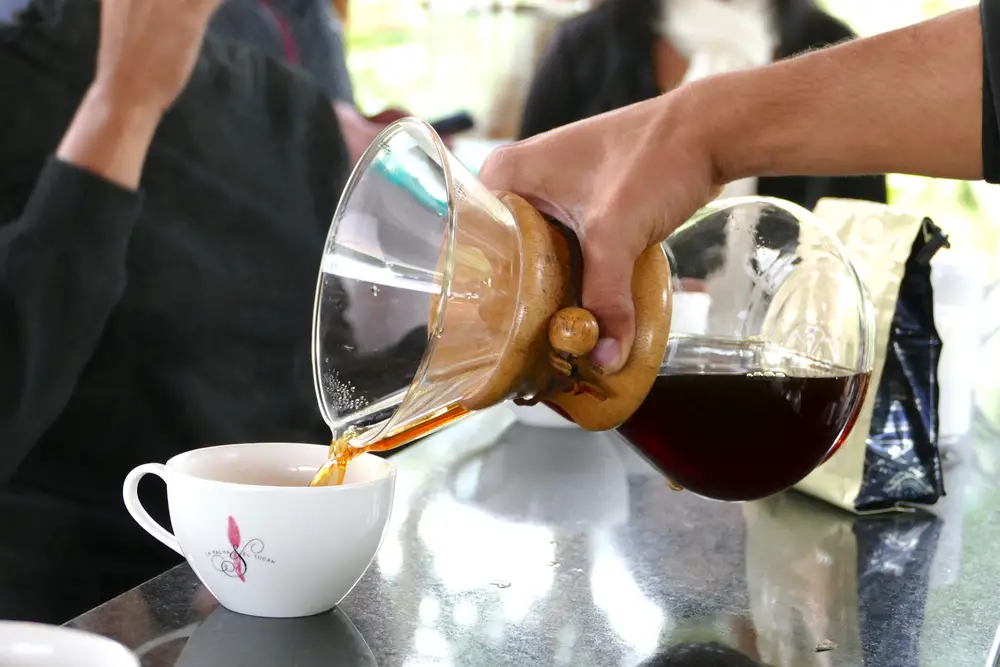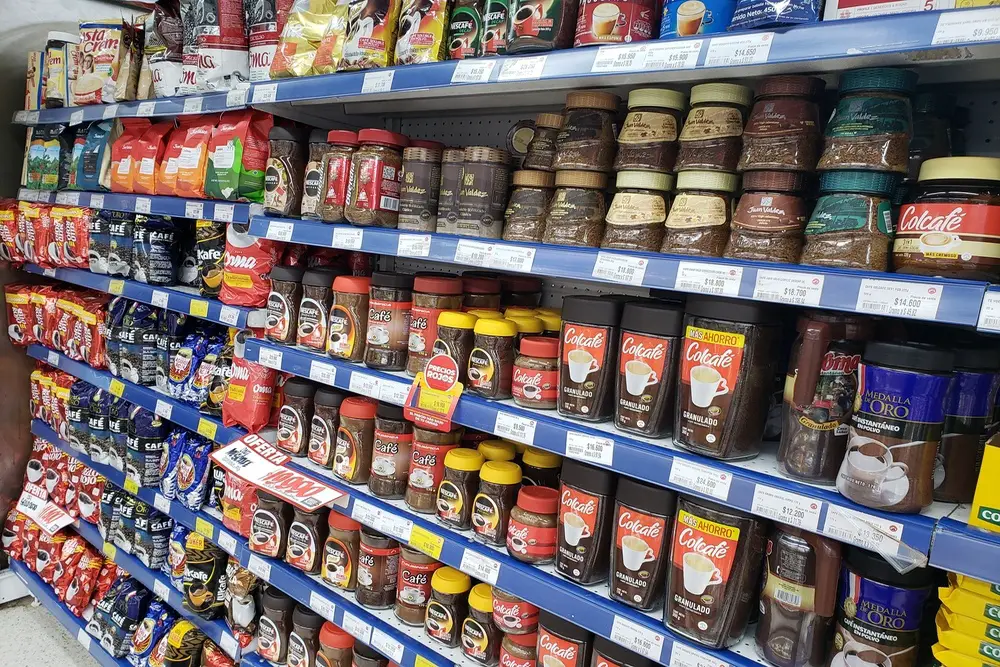This is coffee that comes from the excrement of none other than the elephant. Now it’s time to talk about the famous Black Ivory coffee.
Table of Contents
What is Black Ivory coffee and why is it so exotic?
The coffee that dethroned Kopi Luwak is made from elephant dung. Black Ivory is made from 100% Arabica beans that have been digested by elephants and then excreted with their feces.
One of the reasons it is one of the most exotic coffees in the world is because of the way it is produced. When the beans pass through the elephant’s stomach, they take on a unique and special flavor and characteristics. Moreover, unlike the civets, the elephants live in the best conditions.
Its history
Black Ivory Coffee originated thanks to Blake Dinkin, a Canadian entrepreneur. For 10 years, he invested his resources and time to create this coffee. It definitely wasn’t easy or quick. Over a long period, he spent a lot of time searching and perfecting the entire process. He had to find the ideal place to grow the coffee, the type of beans, and the people who would help him. In addition, he also had to think about the care of the elephants and the process after the beans were expelled from the animals.
Today, coffee is grown in Thailand in an area known as the Golden Triangle. Because of their social and environmental commitment, the people involved in the entire process are all local people. Many elephant keepers (called mahouts) and their families earn their living from the production of this coffee.
How is Black Ivory coffee made?
It actually all starts in the traditional way. 100% Arabica coffee beans in Thailand are harvested and carefully selected. These crops are grown at an altitude of 1,500 meters above sea level and therefore in the best conditions.
After harvesting, the keepers prepare food for the elephants, including coffee cherries. The animals feed on fruits such as bananas, but also on rice, sugar cane, tamarind and others.
The animals may or may not chew the beans, but generally, they swallow them whole. Then they begin to digest. This can take anywhere from 12 to 72 hours, depending on how much the elephant has eaten. Once the coffee cherries are excreted, they are sorted by hand by the staff.
After sorting, the coffee cherries are taken to the local school. There, they are washed by high school students and dried in the sun. When they reach the ideal drying point, the skins are removed. They are also sorted by size by a machine. The largest beans are then selected by hand and inspected for defects. Finally, the beans are roasted and packaged as needed. This ensures that the coffee arrives at its destination as fresh as possible.
Social and animal responsibility
As we could see, several actors are involved in the production process of this coffee. Black Ivory Coffee Company is aware of their role and influence in the place where they operate. Therefore, they have a clear social and animal responsibility.
First of all, they support the Golden Triangle Asian Elephant Foundation. This non-profit organization, based in the Golden Triangle in Thailand, rescues elephants and mahouts from all over the country. They usually come from the streets, from elephant shows and resorts, from illegal logging camps, etc.
The Mahouts
You may have noticed that they don’t just rescue animals. It is important to clarify that elephants have always played a major role in Thai culture. That’s why there are mahouts or elephant caretakers, a word that comes from Hindi.
Originally, this was a highly valued profession and mahouts owned an elephant for life. They were responsible for its constant care and health. However, their conditions changed and so did their purpose.
Today, many of them work with their animals in undignified conditions and for very low wages in resorts. A mahout’s only source of income is their elephant. However, they often end up in bad places, which also harms the animals. Some of them do not even get a salary but live only from the tips of the tourists.
For this reason, Thai foundations that rescue elephants also consider their mahouts. The aim is to provide the necessary help so that both of them can have a better quality of life. For this purpose, the foundation rents the elephants to provide them with accommodation, a natural environment, and veterinary care. It also provides food, medical care, housing, and insurance for the mahouts and their families. This way, they don’t have to resort to illegal jobs where they work in horrific conditions.
At Black Ivory Coffee, not only are the mahouts employed but their families are also supported. Their children are well educated, especially in environmental issues. In this way, they help to reduce the frequent conflicts between elephants and humans in the future. Students from local schools learn how to wash and dry coffee and are paid for this work. With this money, they improve their living conditions and those of their family and save money for later university studies.
Elephants
One of the most frequently asked questions is whether elephants suffer harm from the caffeine in coffee. The answer is no. The brand explains that the animals primarily swallow the whole cherry. This means that the protective layer of the bean retains its oils inside. Moreover, caffeine can only be extracted by heat. Therefore, the elephants do not come into contact with it at any time and the beans do not harm their health.
As mentioned, the animals are in the best condition. They live in a safe and natural environment, are well-fed, and receive daily veterinary care.
What does Black Ivory coffee taste like?
It is not for nothing that this is one of the most exotic coffees in the world. There’s a reason for the fact that elephants were chosen and the way it’s made. As Black Ivory states on its website, a study conducted by the University of Guelph revealed two findings.
Digestion affects the taste of coffee. During this process, elephant enzymes break down proteins in the coffee. This is one of the factors responsible for the bitterness. Therefore, the less protein there is, the less bitterness the drink will have.
Secondly, since elephants are herbivores, they use more fermentation for digestion. This is perfect for flavor because it helps bring out the sweetness of the coffee. It also transfers some of the flavors from the fruit to the bean.
The result is a unique coffee with notes of chocolate, cherry, malt, spices and herbs. In addition, it does not have the burnt or bitter taste of other coffees. Therefore, the cup is soft and sweet, but very aromatic.
How much does Black Ivory coffee cost?
This coffee is not only one of the most exotic, but also one of the most expensive coffees in the world. A 35-gram packet of roasted coffee beans costs $100 USD. With this amount, you can make only about 4 cups of espresso. The brand not only sells packs of roasted beans but also offers Nespresso-compatible coffee capsules. A box of just 6 costs $42 USD.
There are several reasons why this coffee is so expensive. First, the particular way of preparing this coffee is not easy. Working with elephants is very different from working with humans in the traditional way. When working with animals, many unpredictable situations can occur. It is possible that the elephants do not eat the fruit whole, but chew it. This makes it unusable, so for 1 kg of coffee, you need 33 kg of its fruits.
It also happens that elephants do their business in places that are difficult to access or even in water. Then a part of the production is also lost.
Where can you buy Black Ivory coffee?
Black Ivory is sold mainly to selected 5-star hotels. Examples include Anantara, Grand Hyatt, The Athenee Hotel, and many others. However, you can also buy the coffee from their website.
Other exotic coffees
Conclusions
The best coffees can come from the most unusual places, such as elephant dung. Black Ivory is certainly one of the rarest and most exotic coffees around. For many, it may not be so tempting to try a coffee that is made from the feces of an animal. But it is precisely this process that gives it its special flavor.


